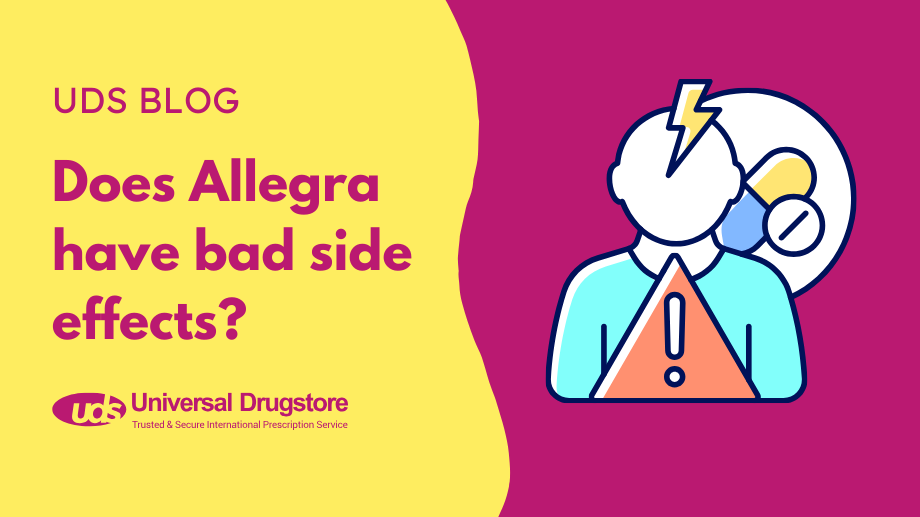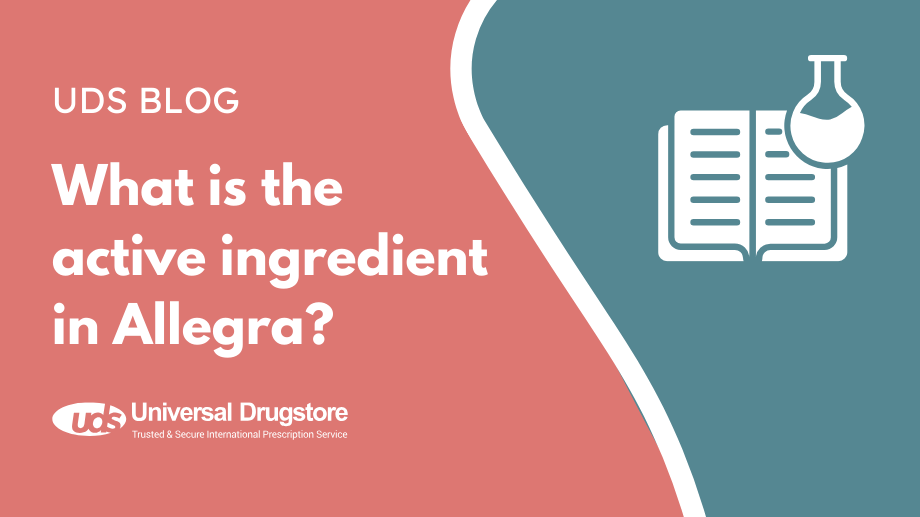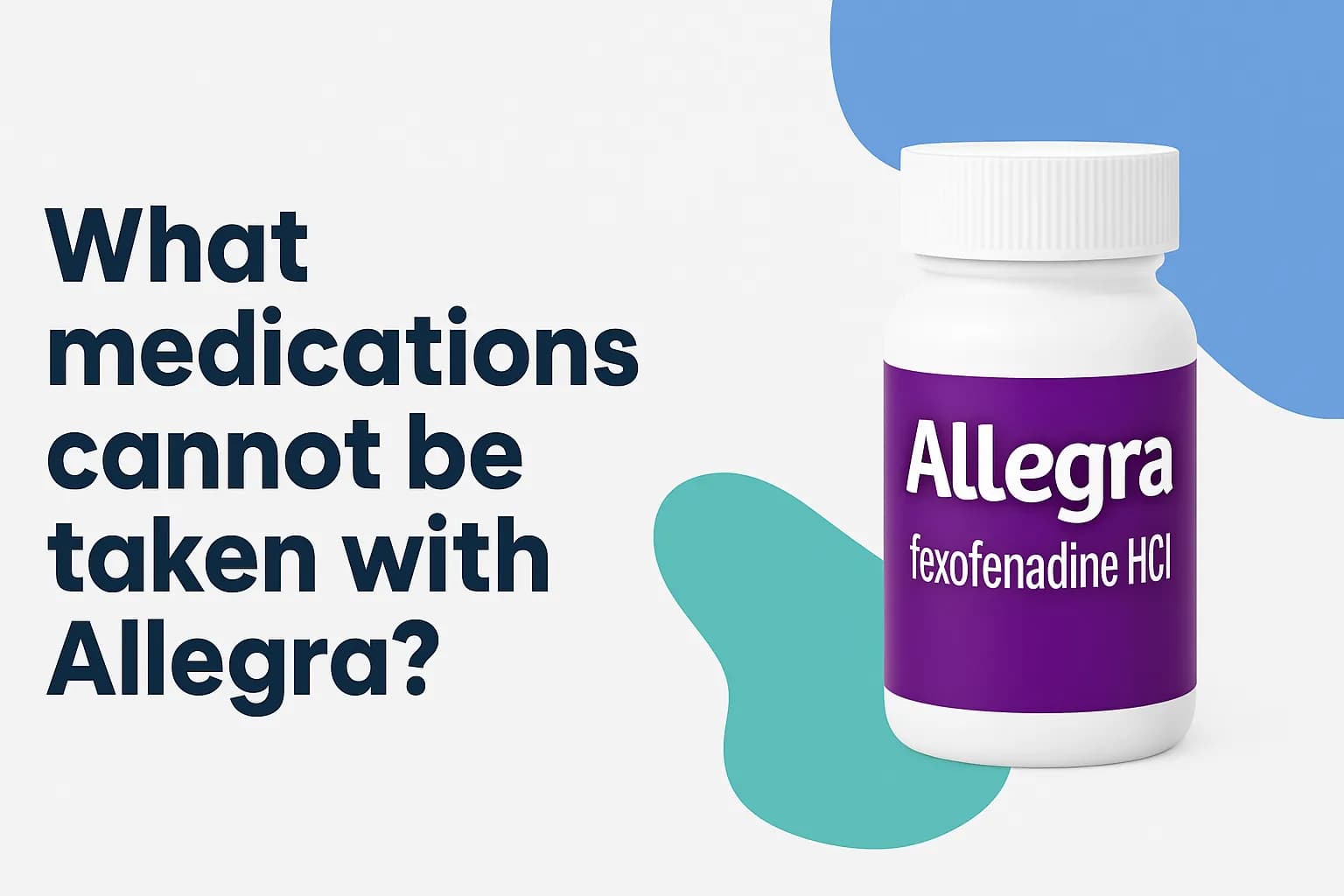Does Allegra have bad side effects?

If you are suffering from hay fever or seasonal allergies, your healthcare provider may prescribe an FDA-approved antihistamine like Allegra (fexofenadine) to provide relief. Allegra works by blocking histamine, a naturally occurring chemical in your body. Histamine is responsible for allergy symptoms, such as sneezing, runny nose, stuffy nose, hives (urticaria), and itchy eyes, or watery eyes.
Allegra is a second-generation antihistamine, which means it is less likely to cause drowsiness than older, first-generation antihistamines like Benadryl (diphenhydramine). Allegra is available over the counter (OTC) as an oral tablet/capsule, oral suspension, and an orally disintegrating tablet, so you do not need a prescription to get this medication.
As with all medications, Allegra can have side effects. You may not experience any side effects with this medication. If you do, most will be mild and will generally go away after you stop taking it. Although it is typically safe and well tolerated, it is important to know what you might experience while taking it.
Most Common Side Effects of Allegra
The most common side effect of Allegra is headache. Some other common side effects include upper respiratory infection, cough, vomiting, and diarrhea.
Less Common Side Effects of Allegra
Some less common side effects of Allegra include back pain, fever, menstrual cramps, dizziness, stomach pain or discomfort, sleepiness, and dry mouth.
Serious Side Effects of Allegra
While rare, Allegra may cause some serious side effects, including:
- Serious allergic reactions such as anaphylaxis. Symptoms can include hives, swelling of your face, tongue, and throat, low blood pressure, and trouble breathing. If you notice any of these symptoms, seek immediate medical attention.
- Taking too much Allegra or using more than one medication containing an antihistamine (including topical products) can lead to an accidental overdose. This can cause severe complications including seizures, hallucinations, or even death. If you or someone you know has taken too much Allegra and are having severe complications, call 911 immediately. Otherwise, call a poison control center at 1-800-222-1222 right away for medical advice.
- Allegra ODT (orally disintegrating tablets) contains phenylalanine and could be dangerous if you have a genetic condition called phenylketonuria (PKU). Ask a pharmacist or healthcare professional if you are not sure if a specific Allegra product contains phenylalanine. There are other formulations of this medication that might be safer for you.
What drug interactions are there with Allegra?
When Allegra is taken with other prescription drugs, over-the-counter medications, vitamins, and supplements, it may change how they work or increase the frequency or severity of side effects. Make sure that you tell your healthcare professional about anything that you are taking, including:
- Other medicines that cause drowsiness (such as cold or allergy medicine, sedatives, narcotic pain medications, sleeping pills, muscle relaxers, and seizure, depression, or anxiety medications). They can add to the drowsiness caused by Allegra.
- Erythromycin and ketoconazole. Studies have shown that these medications may increase Allegra levels in your body which makes you more likely to experience side effects. If you are taking oral erythromycin or ketoconazole, talk with your healthcare provider about which allergy medicines are safe to take with them.
- Do not take antacids containing aluminum and magnesium within 2 hours of taking Allegra as they can lower the amount of Allegra that is absorbed by your body, which can make it less effective.
- You should also avoid drinking fruit juices such as apple, grapefruit, and orange juice when you take Allegra. Taking it with these fruit juices can decrease how much Allegra is absorbed into your bloodstream and make it not work as well. You can avoid this interaction by not drinking fruit juice within 4 hours before or 1 to 2 hours after taking this medication.
Who should not take Allegra?
You should not take Allegra if you are allergic to the active ingredient fexofenadine or any of the inactive ingredients in that particular product. You should use caution with Allegra if you have certain medical conditions such as:
- Kidney disease: The effects of fexofenadine may be increased because of slower removal of the medication from your body.
- Phenylketonuria: The oral disintegrating tablets contain phenylalanine and could be dangerous if you have this condition.
Is Allegra safe during pregnancy or lactation?
Most second-generation antihistamines such as Allegra are generally considered safe to use while pregnant. However, you should talk to your healthcare provider before taking any medication if you are pregnant or think you may be pregnant.
Studies have shown that Allegra is found in breast milk in small amounts. However, it is unlikely to cause problems for your baby. Be sure to talk to your healthcare provider about all your breastfeeding questions and concerns before starting Allegra.
What should you do if you miss a dose of Allegra?
If you miss a dose of Allegra, take it as soon as you remember. However, if it is close to the time for your next dose, skip the missed dose and continue with your regular dosing schedule. Do not double your dose to make up for the missed one.
How do you take Allegra?
Allegra is a brand-name medication that is typically taken once or twice a day for seasonal allergic rhinitis (hay fever). The tablet, capsule, or suspension can be taken with or without food. You should be sure to shake the suspension well before each use.
If you are using the orally disintegrating tablet, take it on an empty stomach. Allow the tablet to dissolve on your tongue and then swallow, with or without water. Do not remove the tablet from the blister pack until you are ready to use it.
All Allegra products should be kept at room temperature, away from moisture, and out of the reach of children.
Related Medications
- Allegra Oral Suspension (fexofenadine)
- Allegra D (fexofenadine/pseudoephedrine)
- Claritin Syrup (loratadine)
- Clarinex Syrup (desloratadine)
- Xyzal Oral Solution (levocetirizine)
- Benadryl Elixir (diphenhydramine)
Sources
- Huang, C., et al. (2019). Antihistamine effects and safety of fexofenadine: A systematic review and meta-analysis of randomized controlled trials. BMC Pharmacology and Toxicology. Accessed June 10, 2024.
- Allegra. Medscape. Accessed June 10, 2024.
- Allegra [package insert]. Sanofi-Synthelabo Limited. DailyMed. Accessed June 10, 2024.







